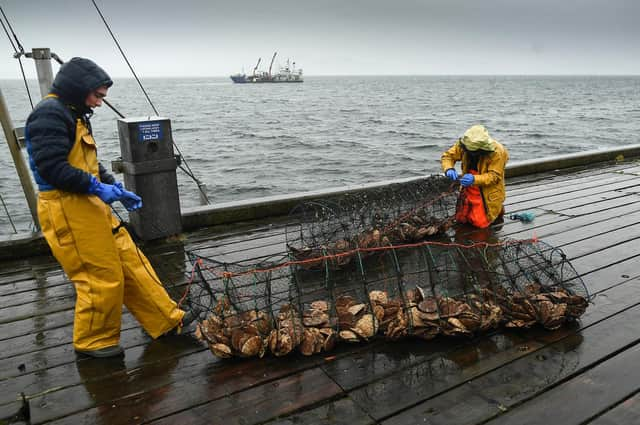'The UK government has got to intervene' The smaller Scots firms struggling to stay afloat due to Brexit


Speaking to The Scotland on Sunday, numerous groups raised concerns over how smaller companies were managing, and called for more support from the UK Government
Jimmy Buchan, CEO of the Scottish Seafood Association claimed bigger companies were now absorbing the smaller ones “like a sponge” because they could no longer afford to export.
Advertisement
Hide AdAdvertisement
Hide AdHe said: “It’s a two sided story, year on year volume is up and the problem is that’s where the politicians hang their hat, they can demonstrate the figures look good.


“But the small guys are still not exporting because the caveats, the hoops, paper trail and resources to create certificates etc are simply too cumbersome for smaller companies.
“The UK government has got to intervene and find a way to get the small niche producers to get back into the market.
“The small guys didn’t ask for this, and the UK government shouldn’t stand aside and let it happen to them.
“It’s all right for them to look at a stack and say you’re selling fish, but there is a problem and we need to look at the micro side rather the macro.”
The Executive Manager of Scottish Association of Meat Wholesalers Martin Morgan explained the deal had seen the amount sent to Europe plummet.
He explained: “The volume is still down on what we'd normally do due to the extra time in sending them to Europe.
“It’s down at least 50 per cent, maybe two thirds, that’s a rough estimate based on feedback from our members.
Advertisement
Hide AdAdvertisement
Hide Ad“It does take longer, and it’s more costly for our members, and it may not be the same price they can get in mainland Europe.
“Because of extra time delays, customers in Europe are now looking elsewhere.
“They may want it within 48 hours but with the new rules that’s impossible to achieve for our members.
“If you want to export you have to bear the extra costs and still hope you can make the margin when you make a sale, and that’s not always what’s happening.
“It just reflects the consequences of the trade deal that the UK made with the EU commission.
“The meat industry has been hit hard.”
Colin Borland, the Federation of Small Businesses director of devolved nations claimed support from the UK Government was not doing enough for smaller firms.
While the end of the transition period has caused some disruption to small Scottish importers and exporters, the pandemic has also made it difficult to identify the scale of the problem.
“While the UK Government is providing some help for firms finding the new arrangements difficult, the changes look to be placing a disproportionate burden on smaller operators.
Advertisement
Hide AdAdvertisement
Hide Ad“The pandemic, alongside the government response, has been a much greater challenge to the average Scottish firm than Brexit.
“But we’re not seeing many businesses at this stage reporting major dividends associated with the decision to leave the EU.”
The UK Government has established a Scottish Exports task force along with the Scottish Government, which meets fortnightly to resolve issues facing the sector.
The Scotland on Sunday understands there is ongoing dialogue to attempt to address the problems facing the smaller firms.
A UK Government Spokesperson said: “The Trade and Cooperation Agreement has allowed us to take back control of our money, borders, laws and waters. It enables us to strike trade deals around the world, to the benefit of agri-food businesses across the UK.
“We are providing the support that businesses need to adapt to our new trading relationship. This includes a £20m SME Brexit Support Fund, dedicated support for fishermen and seafood exporters, tripling the number of official certifiers to meet demand, and developing new digital trade platforms.
“The new timetable for introducing import checks is pragmatic and allows businesses more time to adjust as Covid-19 restrictions are lifted.”
If you haven't already, please consider supporting our trusted, fact-checked journalism by taking out a digital subscription.
Comments
Want to join the conversation? Please or to comment on this article.
